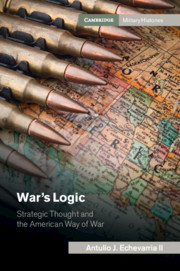Book contents
- War’s Logic
- Cambridge Military Histories
- War’s Logic
- Copyright page
- Dedication
- Contents
- Acknowledgments
- Introduction
- Part I First Principles and Modern War
- Part II The Revolt of the Strategy Intellectuals
- 3 Bernard Brodie, Robert Osgood, and Limited War
- 4 Thomas Schelling and War as Bargaining and Coercion
- 5 Herman Kahn and Escalation
- Part III The Counterrevolution of the Military Intellectuals
- Part IV The Insurrection of the Operational Artists
- Conclusion
- Notes
- Select Bibliography
- Index
3 - Bernard Brodie, Robert Osgood, and Limited War
from Part II - The Revolt of the Strategy Intellectuals
Published online by Cambridge University Press: 05 February 2021
- War’s Logic
- Cambridge Military Histories
- War’s Logic
- Copyright page
- Dedication
- Contents
- Acknowledgments
- Introduction
- Part I First Principles and Modern War
- Part II The Revolt of the Strategy Intellectuals
- 3 Bernard Brodie, Robert Osgood, and Limited War
- 4 Thomas Schelling and War as Bargaining and Coercion
- 5 Herman Kahn and Escalation
- Part III The Counterrevolution of the Military Intellectuals
- Part IV The Insurrection of the Operational Artists
- Conclusion
- Notes
- Select Bibliography
- Index
Summary
Chapter 3 analyzes the thinking of Bernard Brodie and Robert Osgood, who were among limited war’s earliest theorists. It describes their lives and their "America," which was the golden age of the middle class. They assumed armed conflict, by its nature, would escalate almost automatically to the maximum possible level of violence. Ergo, Brodie rejected the notion that military imperatives should ever guide strategy, especially in an era in which “second-strike” nuclear weapons could render concentration, offensive action, and decision by battle suicidal. In his view, the only way to restore the utility of military force was to ensure it served only limited aims. Osgood likewise insisted America’s political leaders had to contain the aggressive instincts of the military as well as the explosive passions of the populace. His solution involved replacing the military’s imperatives with a set of principles that emphasized political control and close circumscription of all parameters of conflict. They saw war’s nature not as a violent extension of human nature, but as a coiled spring ready to explode.
Keywords
- Type
- Chapter
- Information
- War's LogicStrategic Thought and the American Way of War, pp. 59 - 81Publisher: Cambridge University PressPrint publication year: 2021

